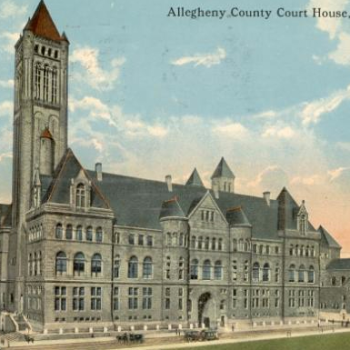Heinrich August Frecke and Benjamin Bernhardt Marschall were fellow German immigrants who met as co-workers at a brick company on Boyd’s Hill before joining to make their livings through crime. Both men had families, though not in Pittsburgh. Both men also had criminal records, in Pittsburgh and beyond.

Returning via train to Pittsburgh from New York City, where they had traveled on business – that business being fencing goods they had stolen in Pittsburgh – they met and befriended John Henry Foerster, a newly-arrived German immigrant traveling alone and apparently a man of some means. Upon arrival in Pittsburgh on August 23, 1865, they lured Foerster to a brickyard on Boyd’s Hill on the premise of helping him get established in his new home. There they stabbed and robbed him.

Foerster’s body was discovered early the next day, though weeks passed before Foerster or his assailants were identified. Arrests of local men produced no suspects.
Investigators determined that the victim and two other men had been seen in local taverns on the evening of the murder. The first real break in the case came on September 22, when Marschall was arrested in connection with a series of robberies and burglaries in the Hill District. A search of his residence found evidence linking him to Foerster’s murder. He is reported to have fully and freely confessed and to have implicated Frecke, who was apprehended in McKeesport.

From his first encounter with the authorities, Frecke maintained his innocence. Marschall, on the other hand, also confessed to two other murders, one in New York and one in Germany.
His account of Foerster’s murder is that he and Frecke committed a robbery on Smithfield St. and then departed for New York to sell the stolen goods. There they met Marschall’s brother, who assisted in fencing the goods for over $500 (approximately $9,000 today). Returning to Pittsburgh a week later, Frecke identified Foerster as a new mark. They remained close with him during the long journey back, gaining his confidence. Once in Pittsburgh, they carried out their plan near Beckett’s brick yard, with Frecke stabbing Foerster.
Frecke, 46, and Marschall, 29, were tried separately. With such a full confession and supporting testimony as well as circumstantial evidence and witnesses, Marschall was tried and convicted of first-degree murder on October 6, only two weeks after his arrest. Frecke’s trial began on October 11 and ended the next day with his conviction. After their motions for new trials were rejected, they were sentenced to death on November 25.

Foerster remained unidentified. On the basis of evidence found in Marschall’s home, Pittsburgh authorities had contacted authorities in Bremen, Germany, asking for assistance. They provided Foerster’s identity on November 8.
Lacking resources and support, no appeals or pardon requests were undertaken. Marschall tried unsuccessfully to escape from jail a week before his scheduled execution.

On January 12, 1866, August Frecke and Benjamin Marschall were hanged, just four days before Grinder’s execution and less than four months after being arrested. On the gallows, Marschall rejected Frecke’s request that he exonerate him.


5 thoughts on “Heinrich August Frecke and Benjamin B. Marschall”